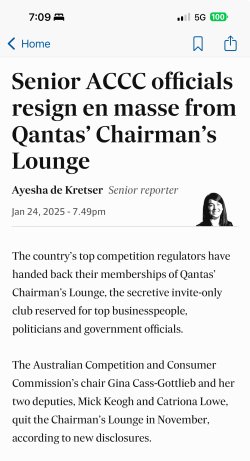I was a NSW Councillor for two terms, and the requirements placed on us by NSW government were strict and onerous, but often ignored, especially by candidates and councillors associated with the Labor, National and Liberal parties. Probably because they saw that their MPs and MLCs weren't bound by similar standards. Also the penalties for breach were slow and small. Often the damage had been done and was not reversible (like development consent given to a mate).
I would have been required to declare a gift like Chairman's Lounge membership, or anything beyond a few dollars value, and recuse myself from any decision that might benefit or disadvantage the donor.


















